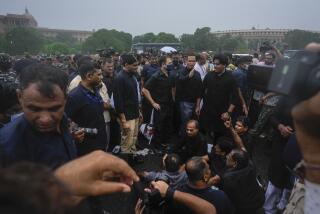As Games close, India ponders a deep-seated ‘it’ll do’ attitude
- Share via
Reporting from New Delhi — The international embarrassment that India suffered in the run-up to the Commonwealth Games — marred by massive cost overruns, a collapsed bridge and widespread corruption allegations — has focused attention on a stubborn cultural condition that if not checked, analysts here say, could undercut India’s superpower ambitions.
An attitude referred to in Hindi as “chalta hai,” which translates to “it goes” but can mean “don’t be bothered,” “whatever,” “it’ll do,” or “don’t fret (such problems as corruption, delays, shoddy quality).”
Or in the words of one commentator: “It’s OK dude, who cares?”
As the Games’ closing ceremony wrapped up Thursday, the attitude appeared to be borne out. Chaos reigned until opening day of the international sports competition, but India ultimately pulled it off. There were no major terrorist attacks, India won 38 gold medals and dancing and marching bands wowed the closing crowd.
As the hangover sets in, however, some wonder why it took prime ministerial intercession to get toilets cleaned in the athletes village, why Indian planning compared so poorly with neighboring China’s hosting of the 2008 Summer Olympics and whether a wing-it attitude befits a nation with such talent, potential and prospects.
“It doesn’t matter if we’re a growing superpower or the stock market’s at record levels,” said Vinod Mehta, editor in chief of the Outlook media group. “What these Games showed is that we’ve hit the limit on chalta hai.”
Some see the attitude growing out of Hindu fatalism and rigid social hierarchies.
“It’s a sense of ‘que sera, sera,’ pre-destination, you’re born upper or lower caste,” said Ravinder Kaur, a sociologist at the Indian Institute of Technology.
Others cite India’s huge population and limited resources, which can leave individuals feeling powerless. “It’s a coping device,” said Amita Baviskar, a sociology professor at Delhi’s Institute of Economic Growth.
For Santosh Desai, president of McCann-Erickson India, chalta hai is epitomized by a story his father recounted of a classmate who stole test answers, then only bothered to memorize the bare minimum required to pass.
Most cultures have something similar of sorts, including the Latin American “manana” and the Middle Eastern “bukrah, insha Allah” (“tomorrow, God willing”) attitudes.
India’s slack Games preparations epitomized chalta hai thinking, analysts said, but examples are widespread in India.
In recent months, the national government has employed tens of thousands of paramilitary forces against Maoist insurgents in central India only to see the effort founder after hundreds of troops were killed on ill-conceived patrols.
“You can’t, after 10 years of inactivity, suddenly throw the paramilitary into battle without any preparation,” said Pramit Pal Chaudhuri, senior editor of the Hindustan Times. “It’s classic chalta hai, don’t bother with the details.”
Critics blamed “chalta hai security” for prolonging the 2008 Mumbai terrorist attack that killed 160 people, with police wielding World War I-era weapons, and wearing ineffective bulletproof vests, allegedly the result of a corrupt procurement system.
And India’s aviation system has suffered from pilot inebriation, political meddling and even the occasional in-flight fistfights between crew members.
“India has lost yet another rising politician to the chalta hai culture,” wrote Times of India Internet editor Rajesh Kalra in September 2009 after local official Y.S.R. Reddy was killed in a helicopter accident amid safety concerns. “We somewhere, somehow, need to wake up.”
Prime Minister Manmohan Singh, an economist, warned industrialists in 2006 that the chalta hai attitude would hurt Indians when competing in business against dynamic East Asian neighbors. He urged chartered accountants in 2008 to end chalta hai bookkeeping practices.
Some see in the chalta hai debate a battle for India’s soul. On one side is the old India of lazy, incompetent bureaucrats and corrupt politicians. Currently, 153 of India’s 543 parliamentarians have criminal records, including 74 for murder, gang warfare and other serious offenses.
“Corruption is entrenched, right from the top,” said Shashi Bhushan Pandit, head of a garbage collectors union. “The prevalent view is, ‘You take some money, I’ll take some too.’”
On the other side is the new India of world-class information technology companies, meritocracy, hard work and adherence to global standards.
“Parts of India have moved on, others haven’t,” said Desai, the businessman. “And when they come into contact, as seen with the Games, there’s an outcry.”
Politicians have promised a thorough corruption investigation after the Games, but some are skeptical.
“People in India have a very short memory,” said Amit Kapoor, a professor at the Management Development Institute outside Delhi. “It’s put under the carpet.”
One feature of chalta hai, experts said, is a tendency to a sense of resignation, letting those responsible off the hook. Columnists noted how quickly the Games scandals were forgotten, a public “horror to hurrah” transition, once gold medals were handed out.
Culture and systems tend to change slowly. “But it’s happening.” said Pratap Bhanu Mehta, president of Delhi’s Center for Policy Research.
A more open economy has spurred competition, boosting consumer choice even as more people head overseas. “People travel outside and say ‘if Singapore’s clean, why can’t we be,’” said Arun Maira, a member of India’s Planning Commission.
Individual companies and government agencies also have led by example, including the on-time and within-budget Delhi Metro. And India’s increasingly vibrant news media have led in disclosing Games scandals and inefficiency.
“We compare ourselves with China,” said Mehta, the editor. “But our opening ceremony had a sense of Indian chaos in it, of spontaneity rather than control. When it comes to chaos, we can beat the Chinese.”
More to Read
Go beyond the scoreboard
Get the latest on L.A.'s teams in the daily Sports Report newsletter.
You may occasionally receive promotional content from the Los Angeles Times.




